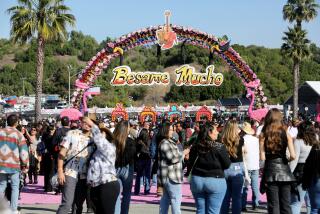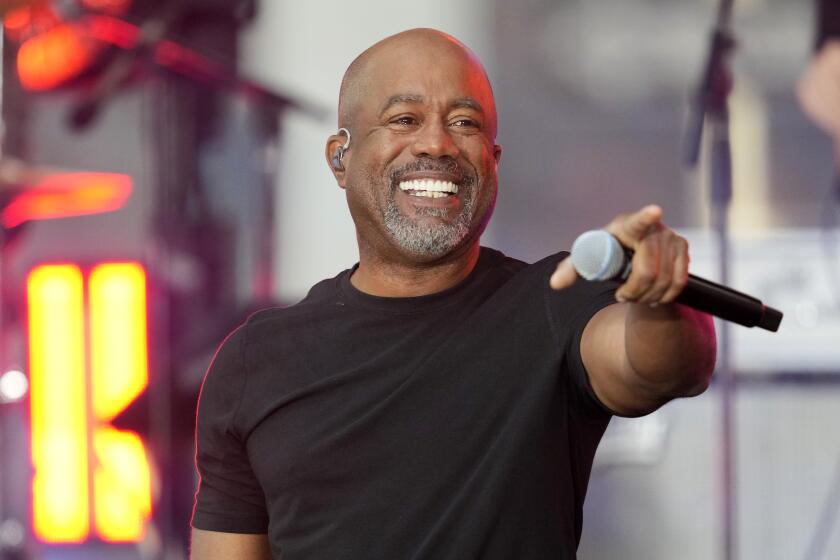Punching a hole in the wall
BEIJING -- As a group that entered the music world urging a generation of alienated youths to “fight the powers that be,” Public Enemy would seem to be the last band a government still shadowed by the student crackdown in Tiananmen Square would want performing in the heart of Beijing.
But next week, the hip-hop group will headline an open-air concert in the Chinese capital’s sprawling Chaoyang Park along with another band equally well known for its antiestablishment rage, Nine Inch Nails.
That both will appear with the full sanction of the country’s Ministry of Culture as headliners for the Beijing Pop Festival on Sept. 8 and 9 -- along with China’s most famous rock star, Cui Jian, whose songs became anthems to the 1989 student movement -- has amazed even some veterans of the capital’s music scene.
“I was totally surprised,” said Jon Campbell, a Toronto-born musician and local concert organizer who has lived in Beijing for six years. “I just know [Public Enemy’s] Flavor Flav was denied entry into Canada. . . . Who knows what they’ll do when they get on stage?”
But to festival organizers, it is just the latest in a series of social and economic juxtapositions that have become commonplace as China opens itself up to the world with increasing rapidity. They see government approval as official acknowledgment that Beijing, as it prepares to host the world at the Olympics next year, must expand its artistic offerings if it is to emerge as an Asian cultural capital.
“If you look at the lineup this year, it’s a pretty substantive lineup -- it’s putting China on the map,” said 28-year-old Jason Magnus, a fast-talking Londoner who founded the festival in 2005. “I only have good things to say about the government. They let this lineup into China.”
Big-name Western rock stars have hardly been strangers to Chinese stages in recent years. But most have been tame pop groups -- the Backstreet Boys have performed twice since 2004 -- or acts aimed at expatriates here. Ticket prices were so high for last year’s Rolling Stones concert in Shanghai, for example, that Mick Jagger joked that all in attendance were either foreign bankers or their girlfriends.
The third installment of the Beijing Pop Festival is neither tame nor intended for expats. At the equivalent of $25 per day, ticket prices are high by local standards, but low enough that many in the capital’s growing middle class can afford them. Concert organizers proudly tout that last year about 60% of the estimated 22,000 attendees were locals; this year they have planned for an audience of 30,000 over the two days.
Magnus acknowledged he has had to make concessions to appease government authorities. Most notably, he must refer to Public Enemy as “P.E.” in all local media interviews and promotional materials. “Public-plus-Enemy is not a good combination to have,” he shrugged.
Even naming the festival was done with government regulators in mind. The concerts have mostly featured punk, hip-hop and indie-rock acts. But Magnus chose to dub his creation a gentler-sounding “pop” festival in the hope that “popular” music would be more agreeable than still-suspect “rock” in the People’s Republic.
Still, the process of getting foreign bands cleared to play remains an arduous one. Magnus was required to submit detailed biographies of each group as well as all lyrics to the Ministry of Culture. Approval can take months.
The concert series has been helped, much like other Western businesses here, by partnering with local operators. In Magnus’ case, he linked with the more-established Beijing Music Festival, which has been bringing foreign orchestras to the capital since 1998.
Nine Inch Nails is not the Orchestre de Paris, however, and part of the reason for his success in winning permits and visas for controversial bands, Magnus said, is his willingness to steer away from politics -- or at least Chinese politics.
To persuade officials that Public Enemy was not a political threat, for example, he pitched the rap group as a band with a “social conscience” and champions of America’s black underclass.
“We don’t want to talk about Taiwan or Tibet; this is about the music,” he said, seated at a Starbucks near his office in Beijing’s diplomatic quarter. He said some acts chafe at such restrictions but added: “All we can say is, ‘As an artist, do you want your music to be heard?’ ”
Others in the rock music scene here have a much simpler explanation for Magnus’ ability to get seemingly controversial bands into the country: Most Chinese bureaucrats have never heard of Nine Inch Nails.
“Although the government has always been controlling of rock music, they’ve never understood what rock is,” said Shan Qi, a prominent television director and music producer who was a senior executive at MTV China for six years. “They never understand what the foreign bands are saying.”
And even if they do understand, others argued, they simply don’t care. Chinese rock fans remain small in number and at the musical fringe, denizens of underground bars and clubs. As a result, the appearance of non-Chinese-speaking musicians presents little threat to the government.
“As long as it’s confined to small venues that hold a couple hundred people, they’re not going to care,” said Catherine Cook, a British schoolteacher turned rock entrepreneur who has started her own hip-hop record label here.
It wasn’t always so. In the mid-1980s, Cui caused a sensation with his stripped-down, Bruce Springsteen-like ballads, earning him the moniker “Godfather of Chinese Rock.” Although his songs were not overtly political, their tales of economic hardship touched a chord with Chinese students, making his “Nothing to My Name” something of a soundtrack for the pro-democracy demonstrations in Tiananmen Square.
But after the 1989 crackdown, Cui was effectively barred for 12 years from playing any large venues in Beijing. In his wake, a small and passionate punk and metal scene has emerged, but many music professionals here argue the appeal is as much about the genre’s nonconforming apparel than the music itself.
Shan, the TV director, attributes the emergence of rock in the 1980s to the intellectual fervor associated with China’s first, tentative, pre-Tiananmen openings. Foreign bands of the era, such as Metallica, remain fan favorites.
But since the 1980s, the youth music scene has become dominated by sappy karaoke-inspired tunes. Easy-to-sing numbers with titles such as “Mice Love Rice” have dominated the airwaves, in part for commercial reasons: With rampant piracy, sales to karaoke clubs have become a crucial revenue stream.
Only a handful of devoted fans is familiar with bands such as Public Enemy and Nine Inch Nails. “Those who listen to pop music don’t know them, of course, only the rock fans,” said Han Xu, a 30-year-old magazine editor who has been an avid listener for 15 years. “China didn’t have any chance to touch this [kind of music] until the reform and opening in the ‘80s, but in the West this is their culture and tradition.”
There is also little doubt that more serious domestic rock bands have been constrained by the prospect of government censure. The threat is not overt, musicians and managers say, but it inspires fear and self-censorship that hinders development.
“They don’t sing about bringing down the government, but they do sing about life experiences, which has political connotations,” says Campbell of bands he manages. “They know better. They want to keep doing it.”
Magnus said he is intent on introducing Chinese audiences to musically important groups, including groundbreaking punk acts New York Dolls and the Ramones’ Marky Ramone, both of whom will perform at this year’s show.
It isn’t all about the money, he insisted -- at least not yet.
Although the festival has grown quickly, it is run by a relatively small operation. Magnus’ Rock for China, the company that organizes the festival and manages some emerging Chinese rock bands, has offices in Beijing and Hong Kong but has a staff of only 10, relying on a legion of interns to contain costs.
To make ends meet, Magnus has relied heavily on corporate sponsors, including MasterCard and cognac maker Hennessy, both of which have been with the festival since its first year. Bands that agree to play here normally take significant fee cuts in return for the exposure.
Even so, while this year’s lineup includes some of music’s most influential artists, all are a few years past their commercial peak. Rock groups in their prime will often make Tokyo their only Asian stop on world tours; China remains too low-paying.
Still, Magnus thinks he can eventually make the market work. While working in the financial services firm Morgan Stanley’s Hong Kong office, the Harvard-educated audiophile decided that, even with piracy destroying record sales, there still was a chance to build a business.
He quit Morgan Stanley and moved to Beijing in 2004. The first festival was modest, a one-day affair with a single stage headlined by former Stone Roses frontman Ian Brown. Since then, the event has grown to two days and three stages, a sign, organizers hope, of a maturing Beijing rock scene.
Others aren’t so sure. Managers note that the basic infrastructure to promote local bands, such as radio stations devoted to the genre, simply doesn’t exist.
“I think the rock festival is attracting people who love rock; it’s not changing audiences,” said Shan over tea in Beijing’s central business district.
Likening rock music to a scream from disaffected youth, he argued that China’s younger generations are too concerned about making money to do much screaming these days.
“People have no desire to scream,” he said, “or they feel like it’s no use to scream anyway.”
--
Gu Bo of The Times’ Beijing bureau contributed to this story.
More to Read
The biggest entertainment stories
Get our big stories about Hollywood, film, television, music, arts, culture and more right in your inbox as soon as they publish.
You may occasionally receive promotional content from the Los Angeles Times.










